Study abroad
Stamp your passport, expand your horizons, view the world through a social work lens.
VCU and the School of Social Work can help you go global – and help to pay for it.
VCU’s Global Education Office offers a variety of study abroad programs and funding sources.
The School of Social Work has two signature, faculty-led study abroad opportunities. It also offers a Global Social Work Enrichment Fund that will pay B.S.W. and M.S.W. students $2,000 if they are accepted to either school-sponsored program.
International Social Work Collaboratory
Learn more about how the VCU School of Social Work is creating research partnerships, learning opportunities and teaching collaborations that are spanning from Richmond across the globe, furthering the transfer of knowledge and skills in both directions.
VCU Summer: Exploring Ghana Through the Lens of Art, Identity, and Social Justice
- Program director: Nicole Corley, Ph.D., social work associate professor. ncorley@vcu.edu
- Dates: June 3-13, 2024
- Application deadline: Feb. 15, 2024
- Eligibility: Open to all VCU students
Central to this study abroad in Ghana, West Africa, is recognizing the value of African knowledge and African solutions in the international community. To that end, this trip is less about traditional service learning and more so about gaining a holistic understanding of Ghana and the richness of its cultural identity expressed through music, art, and other cultural traditions.
Participants will reflect on the global impact of the country’s history, particularly through the lens of the diaspora and how it impacts identity both inside and outside Ghanaian borders. Local engagements with Ghanaian social work organizations offer students the opportunity to learn about the key social challenges in Ghanaian communities and the African-based solutions developed to address them.
Connecting with local organizations like Global Mamas and the Alliance for African Women Initiative will enable students to bridge their skills with community members and learn important new perspectives from local professionals. The program also aims to develop a student-led symposium for social work students at the University of Ghana and VCU students.
Learn more about the 2023 trip with the blog, Akwaaba – A journey abroad to Ghana ».
Dr. Corley learning how to weave Kente cloth on a loom.
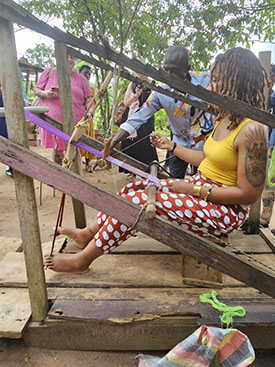

A VCU student prepares a traditional Ghanaian dish during the 2023 study abroad trip.
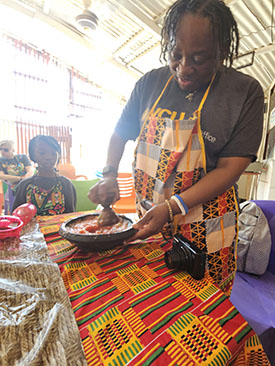

Participants cross the 1,000-foot-long canopy suspension bridge in Kakum National Park, Ghana.
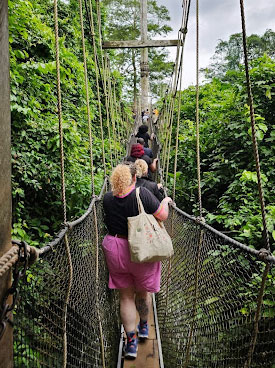

VCU Spring Break: Camp Qmunity Cape Town & Johannesburg: LGBTQIA+ Intersectional Experiences of Post Colonial South Africa
- Program director: Maurice Gattis, Ph.D., social work associate professor. gattism@vcu.edu
- Dates: March 7-16, 2025
- Application deadline: Dec. 1, 2024
- Eligibility: Open to all VCU students; 14 students will be selected in 2025.
Through an intersectional lens that includes gender, sexuality, race, and class, this program will highlight social issues and how local organizations address issues experienced by the local LGBTQIA+ community.
Students will engage in lectures and dialogues where they will listen and learn from individual lived experiences and stories of local community members from all walks of life. Students will also engage with the country's historical and cultural experiences through a number of immersive experiences:
- Cape Malay Cooking experience in a house in the Bo-Kaap neighborhood
- Service and community dialogue at Pride Shelter
- Tour of Khayelitsha township and meeting with residents
- Conversation with the Institute for Justice and Reconciliation and students from University of Western Cape
- Dinner with well known South African LGBTQ+ rights activist Shifra Jacobson from the Counseling Hub
Dr. Gattis during a Fulbright Scholarship appointment to Cape Town, South Africa, where he also led a 2023 study abroad trip.
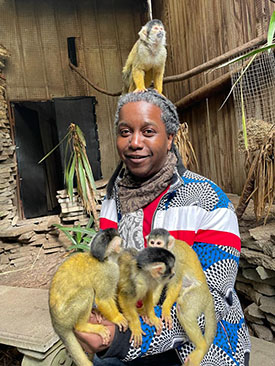

The 2023 trip to Cape Town, South Africa, included a mix of VCU students from social work and other academic programs.
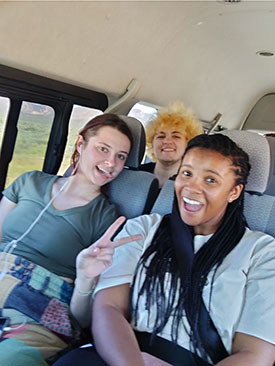

Dr. Gattis has a research partnership with the Department of Social Work at the University of Western Cape.
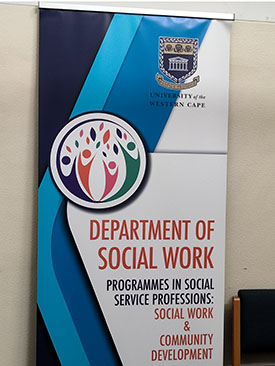

Social work goes abroad in a big way
In a year of unprecedented travel in 2023, five faculty, eight students and a recent graduate from Virginia Commonwealth University School of Social Work renewed old connections, made new ones, fulfilled Covid-delayed plans and – most importantly – immersed themselves in local culture and knowledge.
Exploring and growing as educators, researchers and future social work practitioners, they embodied the unlimited opportunities and uncommon impact that characterize the School of Social Work.